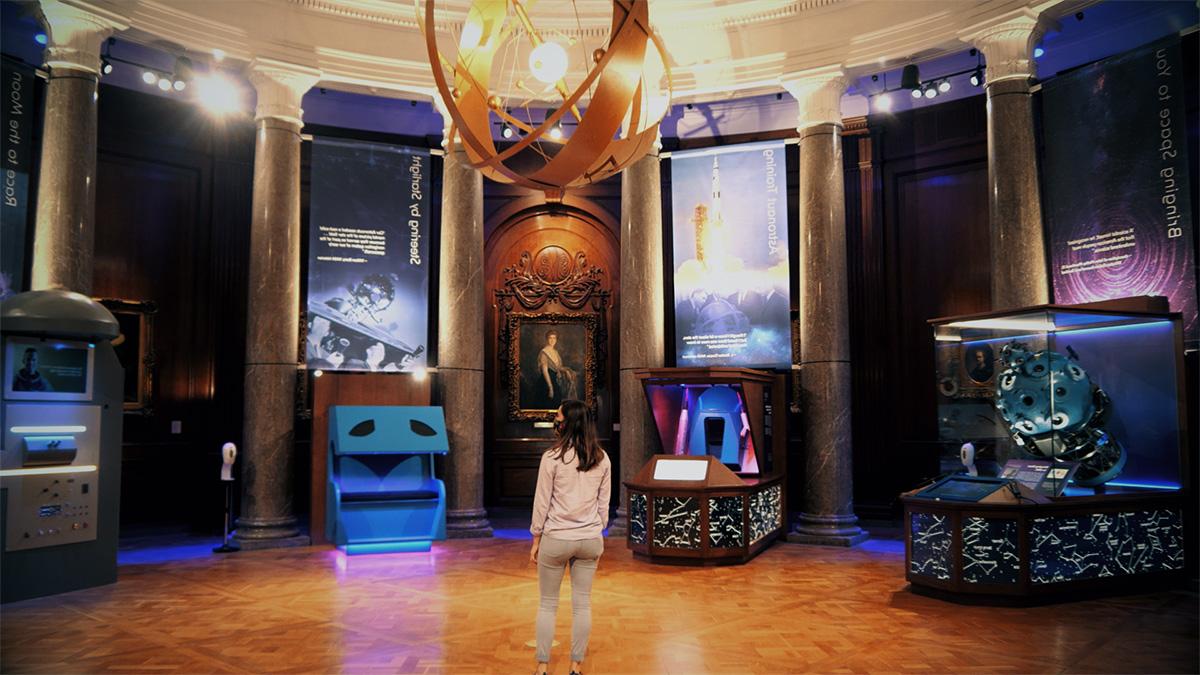Making science fun, virtually
Morehead Planetarium and Science Center’s Virtual STEMville program bolsters remote science learning for K-12 students by virtually bringing experiments and scientists to children wherever they are.

Education sits at the nucleus of Morehead Planetarium and Science Center’s mission. Whether it’s field trips introducing students to the wonders of the sky or outreach using one of the planetarium’s traveling science vans, the renowned institution offers K-12 schools across North Carolina numerous options to bolster STEM learning.
But during the pandemic, all of that in-person programming came to a sudden halt and presented a new question that turned out to be, if not as rigorous as many scientists are used to, no less important: How can Morehead fulfill its educational mission remotely?
Enter Virtual STEMville.
“Since we didn’t have [traditional] outreach this year, we were trying to figure out how we can still serve the state of North Carolina and fulfill our goals of educating and getting people excited about science,” says Tamara Poles, Morehead’s community engagement specialist. “And that’s when Virtual STEMville came up.”
The program, which had previously been operating in-person, offers three different virtual sessions that promote STEM subjects for individual students on Tuesdays, and classrooms and schools on Wednesdays.
Virtual STEMville sessions include:
- Astronomy Avenue: Using Morehead’s planetarium software, students learn about the skies over North Carolina, the large frontier of space, and more.
- Scientist Block Party: Combining fun experiments and scientist interviews, this session offers students an opportunity to learn about science and about becoming a scientist.
- Experiment Expressway: Like the fun of a magic show, this session features trained scientists who share an exciting experiment and break down how it works.
Pivoting to the virtual sessions took some thought, but Poles immediately saw the opportunity to make things flashier. “You can be super creative and super engaging because you’re essentially on TV,” she says.
It turns out that science translates well to the virtual medium. “We’re in the inspiration business, and that’s really easy to do when you talk about the wonders of space and the whizzbang things you can do with chemistry and physics,” says Jonathan Frederick, senior manager of strategic partnerships at Morehead.
Poles oversees Scientist Block Party, running the session’s main experiment and hosting the scientist interviews. One of her most frequent experiments is “Elephant Toothpaste,” which teaches attendees about exothermic thermal reactions — things that create heat — and ends with a big foamy bang that looks like something an elephant might use to brush its teeth.
That “wow” factor extends beyond demonstrations, though. Poles discovered that students were so interested in hearing from the scientists she invited to participate in each session that she eventually rearranged the Scientist Block Party so those conversations came first. “Not only are you getting an entertaining, educational program, but you’re going to meet the real professionals behind it,” she explains. “All of the scientists that participate in Virtual STEMville, all do research right here in North Carolina. They are truly North Carolina scientists.”
Joanna Ramirez, a scientist who studies cancer, has participated in Virtual STEMville regularly. “After a couple of times, [Poles] realized that the families and the students really just wanted to learn about us,” says Ramirez, who also serves as the community outreach coordinator at UNC Lineberger Comprehensive Cancer Center’s Community Outreach and Engagement Office. “It was really precious. They definitely ask a lot of questions. That’s a really fun aspect.”
Those conversations are critical and show young students that science doesn’t adhere to one gender or race. There are many people whose questions led them to the field and who have helped shape the research currently taking place within it. “I really appreciate that Morehead did go out of their way to workshop and talk to other scientists of color and really get their ideas and their input,” says Ramirez.
Virtual STEMville has opened the doors to schools once too far away to make a field trip to Morehead. Frederick says schools from as far as Oregon and California have reached out to participate in Morehead’s virtual programming. “If there is a silver lining, it’s that people can find us online,” he adds.
For Poles, the opportunity to foster engagement in North Carolina is invaluable, even though it’s not able to happen in person quite the way it once did.
“I love this whole collaboration with all of North Carolina: we have North Carolina scientists talking to North Carolina families,” she says. “We’re letting people know STEM is everywhere.”




